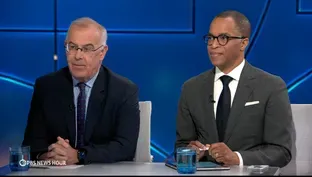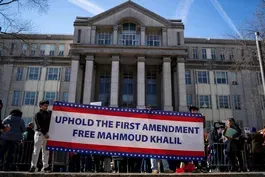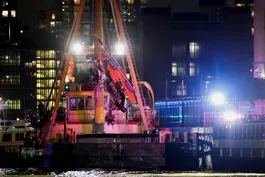
Former Navy SEAL on 'Warfare' and its depiction of combat
Clip: 4/11/2025 | 6m 9sVideo has Closed Captions
Former Navy SEAL on making the new film 'Warfare' and its authentic depiction of combat
Ray Mendoza is a former Navy SEAL and wrote and co-directed the new film, "Warfare." It tells the true story of a mission Mendoza participated in when he and his team were ambushed while conducting a surveillance operation gone awry in Iraq. It's based entirely on the memory of those who lived through it. Geoff Bennett sat down with Mendoza for our arts and culture series, CANVAS.
Problems with Closed Captions? Closed Captioning Feedback
Problems with Closed Captions? Closed Captioning Feedback
Major corporate funding for the PBS News Hour is provided by BDO, BNSF, Consumer Cellular, American Cruise Lines, and Raymond James. Funding for the PBS NewsHour Weekend is provided by...

Former Navy SEAL on 'Warfare' and its depiction of combat
Clip: 4/11/2025 | 6m 9sVideo has Closed Captions
Ray Mendoza is a former Navy SEAL and wrote and co-directed the new film, "Warfare." It tells the true story of a mission Mendoza participated in when he and his team were ambushed while conducting a surveillance operation gone awry in Iraq. It's based entirely on the memory of those who lived through it. Geoff Bennett sat down with Mendoza for our arts and culture series, CANVAS.
Problems with Closed Captions? Closed Captioning Feedback
How to Watch PBS News Hour
PBS News Hour is available to stream on pbs.org and the free PBS App, available on iPhone, Apple TV, Android TV, Android smartphones, Amazon Fire TV, Amazon Fire Tablet, Roku, Samsung Smart TV, and Vizio.
Providing Support for PBS.org
Learn Moreabout PBS online sponsorshipAMNA NAWAZ: The film "Warfare," which premieres tonight in theaters across the country, is not your typical war movie.
Geoff Bennett spoke recently with the writer and co-director, Ray Mendoza.
GEOFF BENNETT: Ray Mendoza is a former Navy SEAL.
And "Warfare" tells the true story of a mission Mendoza himself participated in, when he and his team were ambushed while conducting a surveillance operation gone awry in Ramadi, Iraq, in 2006.
(GUNSHOTS) ACTOR: You hurt?
ACTOR: I'm good.
I'm good.
Check on Elliott.
I think our gear is still in there.
ACTOR: Yes.
ACTOR: Put your arm up.
ACTOR: How bad is it?
ACTOR: Yes, we're going to need (INAUDIBLE) GEOFF BENNETT: The film is based entirely on the memory of those who lived through it.
And Mendoza and his directing partner, Alex Garland, say their goal was to ensure a high level of authenticity to capture the pain, exhaustion, and brutal reality of war.
Our discussion is part of our arts and culture series, Canvas.
Ray Mendoza, director of the new film "Warfare," thanks for coming in.
RAY MENDOZA, Co-Director, "Warfare": Thanks for having me.
GEOFF BENNETT: The process of stitching together the memories of the people who were actually there, what was that like?
RAY MENDOZA: It was a bit tricky, actually, because memories under stress, oftentimes, they will -- you and I can experience a car wreck, and when asked to explain it, your recollection of it may be different than mine.
I may not be affected at all and you can, like, not remember anything.
And so, when we're dealing with these memories, some people remember something, some don't, or they happen at different times.
And so, a lot of times, we would need like a tiebreaker.
If someone says, no, I put the tourniquet on, if another person says no, I did it.
In this case, the Will Poulter character, we both felt we did it, but then Joe, played by Joe Quinn, was like, no, Ray did this and then you did that.
And then it was like, oh, OK.
So we were kind of both right and both wrong.
So that's kind of how the whole process was with everything.
It was really just a matter of a lot of investigative work, just a lot like a forensic approach to it.
GEOFF BENNETT: This film is getting a lot of praise for its authentic portrayal of warfare.
It's these long, unedited scenes.
There's no musical score.
Tell me about that, those creative choices.
RAY MENDOZA: Yes, the -- oftentimes, we can use score.
It's like normal Hollywood film grammar.
We can use score to manipulate the scene.
I can make you feel how I want you to feel.
And so we wanted to remove that.
And I wanted to just use the performance of the actors and live in their moments.
And in regards to the long scenes, we kind of created these like little miniature plays, these blocks.
And there's a lot of things that are concurrently happening.
So I would make an example, if you're in a party and there's a bunch of people talking, it just sounds like white noise.
But if you were to just focus on one group, you would now hear what they're talking.
Everybody was constantly doing something.
And we just focused the camera on where it needed to be based off when we needed it, what we needed to tell.
GEOFF BENNETT: What was the casting process like?
What was it like choosing someone to play you and the other Navy SEALs who lived through that experience?
RAY MENDOZA: Yes, for everyone -- well, I will get to specifically me.
But I kind of had these checks, like these boxes that I needed to check.
And one of them was youth.
I really wanted viewers to understand that it's the youth that typically fight these wars.
The next kind of check of the box was like attitude, attitude and preparedness.
So, when I present my expectations, like, we're going to have really long days.
It's going to be really difficult.
You're going to be tired.
It's going to be stressful.
You're probably going to be hungry.
You're not going to have a lot of time to go back to your trailer.
And if the response is like, well, I don't know, like, OK, you're probably not on the list.
But somebody was like, yes, I need this, I want this, that's kind of a good indicator that their work ethic is going to be what we need on set.
GEOFF BENNETT: What's it feel like now to watch the finished project?
RAY MENDOZA: I'm super proud of the crew, the cast.
Having us there puts a lot of stress.
And I think that helped push them past what they thought they were capable of doing, but extremely proud.
GEOFF BENNETT: Watching the film as a viewer, we know very little about the Iraqis who were present that day.
GEOFF BENNETT: And it also strikes me that the service members knew very little about the Iraqis as well.
Did that track with your experience?
RAY MENDOZA: It's portrayed exactly like it is.
Most of us don't really interact with them.
We're not in there for them.
We're using their house because it's a geographical advantage.
And, oftentimes, when we interviewed the guys that were there, some of them don't recall the family at all.
And so, oftentimes, we don't really interact with them.
So, because I'm doing kind of -- I'm using memories, right, because that's our lighthouse, everything's based off memory, and that's what we remember about the family, is just that was just their role that day, that they didn't really serve any other significance other than that.
GEOFF BENNETT: Is there a particular reaction to this film that has resonated with you?
RAY MENDOZA: Yes, I mean, it's kind of what I expected, at least for veterans, was that -- because it's not only a tribute to Elliott, but a tribute to veterans.
It's like, this is a voice.
It's not the voice, but it's a voice.
And when they say, that's what it was like, like, that's what it felt like, that's what it sounded like, I feel that.
I receive that and that resonates with me, because that's what I wanted to hear.
That's what I needed to hear.
GEOFF BENNETT: Ray Mendoza, co-director of the new film "Warfare," thanks for being here.
RAY MENDOZA: Thank you, sir.
Brooks and Capehart on Trump’s tariffs and market reaction
Video has Closed Captions
Clip: 4/11/2025 | 11m 2s | Brooks and Capehart on Trump’s tariffs and reaction from the markets (11m 2s)
China raises tariffs on U.S. imports in trade war escalation
Video has Closed Captions
Clip: 4/11/2025 | 2m 58s | China raises tariffs on U.S. imports in latest escalation of trade war (2m 58s)
How Trump's trade war is impacting U.S. and global economies
Video has Closed Captions
Clip: 4/11/2025 | 7m 2s | How Trump's tariffs and trade war are impacting U.S. and global economies (7m 2s)
Judge rules Trump administration can deport Khalil
Video has Closed Captions
Clip: 4/11/2025 | 11m 39s | Immigration judge rules Trump administration can deport Columbia protestor Mahmoud Khalil (11m 39s)
News Wrap: Tourist helicopter crashes in Hudson River
Video has Closed Captions
Clip: 4/11/2025 | 5m 24s | News Wrap: Investigators search for cause of tourist helicopter crash in New York (5m 24s)
Patriotism takes hold in Taiwan amid threat from China
Video has Closed Captions
Clip: 4/11/2025 | 6m 29s | Patriotism takes hold in Taiwan in face of growing threats from China (6m 29s)
Providing Support for PBS.org
Learn Moreabout PBS online sponsorshipSupport for PBS provided by:
Major corporate funding for the PBS News Hour is provided by BDO, BNSF, Consumer Cellular, American Cruise Lines, and Raymond James. Funding for the PBS NewsHour Weekend is provided by...

















